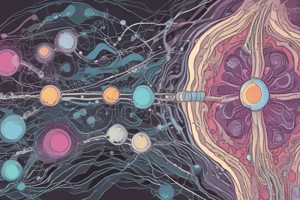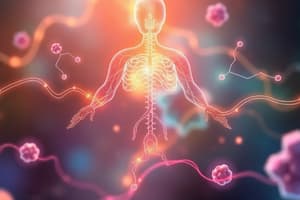Podcast
Questions and Answers
What is the primary function of the adrenal glands?
What is the primary function of the adrenal glands?
- Controlling reproductive functions
- Releasing hormones related to stress response (correct)
- Producing insulin
- Regulating water balance
Which of the following is a common endocrine disorder?
Which of the following is a common endocrine disorder?
- Hypothyroidism (correct)
- Diabetes mellitus (correct)
- Hypertension
- Anemia
How does the endocrine system mainly communicate information throughout the body?
How does the endocrine system mainly communicate information throughout the body?
- Using electrical signals
- By direct connections between cells
- Through chemical messengers known as hormones (correct)
- Via nerve impulses
Which gland is known as the control center of the endocrine system?
Which gland is known as the control center of the endocrine system?
What role does insulin play in the body?
What role does insulin play in the body?
What are tropic hormones?
What are tropic hormones?
Which of the following best describes paracrine signaling?
Which of the following best describes paracrine signaling?
Which of the following organs influences the regulation of body temperature?
Which of the following organs influences the regulation of body temperature?
Which hormone produced by the adrenal cortex is primarily involved in stress response?
Which hormone produced by the adrenal cortex is primarily involved in stress response?
What is the primary function of aldosterone in the adrenal glands?
What is the primary function of aldosterone in the adrenal glands?
Which gland is responsible for producing insulin?
Which gland is responsible for producing insulin?
What essential role does oxytocin play during childbirth?
What essential role does oxytocin play during childbirth?
What does the thyroid stimulating hormone (TSH) promote?
What does the thyroid stimulating hormone (TSH) promote?
What is the effect of adrenaline released by the adrenal medulla?
What is the effect of adrenaline released by the adrenal medulla?
Which hormone primarily regulates the levels of sodium in the body?
Which hormone primarily regulates the levels of sodium in the body?
What hormone secreted by the ovaries is essential during the menstrual cycle?
What hormone secreted by the ovaries is essential during the menstrual cycle?
What is the primary role of insulin in the body?
What is the primary role of insulin in the body?
Which of the following is a common symptom of Type 1 diabetes?
Which of the following is a common symptom of Type 1 diabetes?
Which gland is primarily responsible for producing insulin?
Which gland is primarily responsible for producing insulin?
What factor is NOT associated with the development of Type 1 diabetes?
What factor is NOT associated with the development of Type 1 diabetes?
What happens when a large number of islet cells in the pancreas are destroyed?
What happens when a large number of islet cells in the pancreas are destroyed?
In the management of Type 1 diabetes, which approach is NOT typically used?
In the management of Type 1 diabetes, which approach is NOT typically used?
What is a characteristic feature of hypothyroidism?
What is a characteristic feature of hypothyroidism?
Which of the following conditions involves the body making little or no insulin?
Which of the following conditions involves the body making little or no insulin?
Flashcards
Type 1 Diabetes
Type 1 Diabetes
A condition where the pancreas doesn't produce enough insulin, a hormone needed to allow sugar to enter cells for energy.
Insulin
Insulin
A hormone produced by the pancreas that allows sugar to enter cells.
Pancreas
Pancreas
An organ behind the stomach that produces insulin and other hormones.
Blood Sugar
Blood Sugar
Signup and view all the flashcards
Diabetes Symptoms
Diabetes Symptoms
Signup and view all the flashcards
Hyperthyroidism
Hyperthyroidism
Signup and view all the flashcards
Hypothyroidism
Hypothyroidism
Signup and view all the flashcards
Endocrine System
Endocrine System
Signup and view all the flashcards
Hormones
Hormones
Signup and view all the flashcards
Endocrinology
Endocrinology
Signup and view all the flashcards
Tropic Hormones
Tropic Hormones
Signup and view all the flashcards
Hypothalamus
Hypothalamus
Signup and view all the flashcards
Posterior Pituitary
Posterior Pituitary
Signup and view all the flashcards
Anterior Pituitary
Anterior Pituitary
Signup and view all the flashcards
Paracrine Signaling
Paracrine Signaling
Signup and view all the flashcards
Autocrine Signaling
Autocrine Signaling
Signup and view all the flashcards
Homeostasis
Homeostasis
Signup and view all the flashcards
Posterior Pituitary Hormones
Posterior Pituitary Hormones
Signup and view all the flashcards
Antidiuretic Hormone (ADH)
Antidiuretic Hormone (ADH)
Signup and view all the flashcards
Oxytocin
Oxytocin
Signup and view all the flashcards
Endocrine Glands
Endocrine Glands
Signup and view all the flashcards
Hypothalamus' role
Hypothalamus' role
Signup and view all the flashcards
Thyroid Stimulating Hormone (TSH)
Thyroid Stimulating Hormone (TSH)
Signup and view all the flashcards
Thyroid Gland
Thyroid Gland
Signup and view all the flashcards
Parathyroid Glands
Parathyroid Glands
Signup and view all the flashcards
Adrenal Glands
Adrenal Glands
Signup and view all the flashcards
Cortisol
Cortisol
Signup and view all the flashcards
Aldosterone
Aldosterone
Signup and view all the flashcards
Adrenaline(Epinephrine)
Adrenaline(Epinephrine)
Signup and view all the flashcards
Pancreas
Pancreas
Signup and view all the flashcards
Insulin
Insulin
Signup and view all the flashcards
Gonads
Gonads
Signup and view all the flashcards
Study Notes
The Endocrine System
- A system of glands involving the release of hormones
- Works alongside the nervous system to control body systems
- Nervous system is fast and direct, affecting specific glands and muscles throughout the body
- Endocrine system is slower acting, widespread, affecting various organs and tissues for a longer time
- Hormones are distributed through the bloodstream, released by glands
Endocrinology
- The study of hormones
- Hormones work at a distance, not by direct mechanical attachment
- Composed of amino acids
Types of Signaling
- Endocrine: hormones travel through the bloodstream to target cells
- Paracrine: hormones act locally on neighboring cells
- Autocrine: hormones act on the same cell that secreted them
Functions of the Endocrine System
- Regulates metabolism
- Promotes growth and development
- Controls puberty
- Maintains tissue function
- Regulates internal environment(temperature and water balance)
- Affects mood
Function: Information Signals
- Endocrine system uses blood vessels as information channels, similar to the nervous system which uses nerves
- Glands are located throughout the body, including the brain
- Glands release hormones (chemical messengers) into the bloodstream
Hormones
- Distributed through the bloodstream
- Pass through cells or along plasma membranes until reaching a receptor
- Only affect cells with appropriate receptors
- Some hormones are tropic, triggering the release of other hormones in different glands
Major Hormones and Systems
- The hypothalamus controls the endocrine system's activity
- The hypothalamus releases factors stimulating the anterior pituitary to release hormones affecting peripheral endocrine glands
Hypothalamus
- The control center of the nervous and endocrine systems
- Stimulates the pituitary gland and releases ADH (fluid regulation) and oxytocin (uterus contractions)
Pituitary Gland
- Located in the front of the brain
- Controls:
- Growth
- Other gland functions
- Water level in the blood
- Lactation
- Reproduction
- Ovulation and menstrual cycle
- Reduces sensitivity to pain
- Master Gland: other endocrine glands depend on the pituitary for function
- Example of functions:
- Thyroid gland: Metabolism
- Parathyroid: Calcium regulation
- Adrenal: Fluid balance/stress response
- Gonads: Sex hormones
Anterior Lobe Hormones
- Adrenocorticotropic hormone (ACTH): responds to stress, stimulates adrenal glands to produce cortisol. Cortisol regulates metabolism, blood pressure, blood sugar, and reduces inflammation
- Follicle-stimulating hormone (FSH): stimulates sperm production in males and egg development in females (gonadotropic hormone)
- Thyroid-stimulating hormone (TSH): stimulates thyroid gland to produce hormones that manage metabolism, energy, and nervous system
- Growth hormone (GH): stimulates growth in children and maintains healthy muscles and bones in adults, affecting metabolism
- Luteinizing hormone (LH): stimulates ovulation in females and testosterone production in males (gonadotropic hormone)
- Prolactin: stimulates breast milk production (lactation) after childbirth, but can affect fertility
Posterior Lobe Hormones
- Antidiuretic hormone (ADH), or vasopressin: regulates water and sodium balance
- Oxytocin: stimulates uterine contractions during childbirth
Endocrine Glands
- Hypothalamus
- Pituitary
- Thyroid
- Parathyroid
- Pancreas
- Adrenal
- Gonads (ovaries and testes)
Thyroid/Parathyroid Glands
- Located in front of the trachea (windpipe)
- Thyroid controls:
- Metabolic rate
- Bone growth
- Brain development
- Nervous system development
- Parathyroid has 4 glands located on sides of the thyroid
- Helps maintain normal calcium, magnesium, and phosphate levels
Adrenal Glands
-
Located on top of the kidneys
-
Regulates salt and water balance
-
Stimulates "fight or flight" response (adrenaline)
-
Increases blood pressure and heart rate
-
Cortex produces steroids
- Cortisol: Stress
- Aldosterone: Blood volume
-
Medulla produces catecholamines
- Adrenaline: Fight or Flight
Pancreas
- Located between stomach and small intestine
- Controls insulin secretion based on blood glucose levels circulating through the pancreas
- Regulates blood glucose through insulin and glucagon production
Gonads
- Males: Testes secrete testosterone, regulating body changes, facial hair growth and deepening of voice, muscle growth and strength
- Females: Ovaries secrete estrogen and progesterone, controlling sexual development & involved in pregnancy and menstrual cycles
Common Endocrine Diseases
- Type 1 diabetes: insulin production is low or absent
- Thyroid disease: overactive or underactive thyroid
- Hyperthyroidism: overactive thyroid
- Hypothyroidism: underactive thyroid
- Growth disorders (related to pituitary issues)
- Obesity
Studying That Suits You
Use AI to generate personalized quizzes and flashcards to suit your learning preferences.




